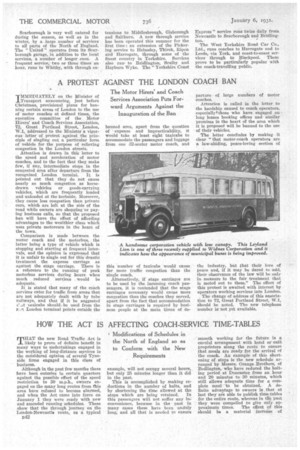HOW THE ACT IS AFFECTING COACH-SERVICE TIME-TABLES
Page 56

Page 57

If you've noticed an error in this article please click here to report it so we can fix it.
Modifications of Schedules in the North of England so as to Conform with the New Requirements THAT the new Road Traffic Act is likely to prove of definite benefit in many ways to undertakings engaged in the working of long-distance services is the considered opinion of several Tyneside firms engaged in this class of business.
Although in the past few months there have been outcries in certain quarters against the possible effect of the speed restriction to 30 m.p.h., owners engaged on the many long routes from this area have refused to become alarmed, and when the Act came into force on January 1 they were ready with new and amended running schedules. These show that the through journey on the London-Newcastle route, as a typical
example, will not occupy several hours, but only 2.5 minutes longer than it did in the past.
This is accomplished by making reductions in the number of halts, and by shortening the time allowed at the stops which are being retained. In this passengers will not suffer any in convenience, because in the past in many cases these have been unduly long, and all that is needed to ensure
smooth working for the future is a careful arrangement with hotel or cafe proprietors along the route to ensure that meals are ready for the arrival of the coach. An example of this shortening of stops is the new schedule arranged by Messrs. Orange Brothers, of Bedlington, who have reduced the halting period at Doncaster from an hour and 20 minutes to 30 minutes, which still allows adequate time for a complete meal to be obtained. A definite advantage to owners is that at last they are able to publish time-tables for the entire route, whereas in the past they were compelled to give only ap
proximate times. The effect pf this should be a material increase of business secured at intermediate Points on the route.
Little difficulty is being experienced in complying with the clause relating to drivers' hours, because most of the coaches already carry two drivers, who normally drive for hourly spells. The longest spell usually undertaken by a driver, it is pointed out, does not exceed 60 miles, or a little more than two hours on duty. Responsible undertakings, therefore, are inclined to regard the Act rather as a boon than the reverse.
By the elimination of -a number of stops and reduction of standing time at lunch and tea halts at Ashbourne. and Newport to 30 minutes and 20 minutes respectively, Manchester limited-stop operators working on the route between London and Manchester and Blackpool are able to complete the thtough trip in only 45 minutes more than in the past.
In the ease of a journey originating at Blackpool one driver will take the coach to Manchester and hand over to a second, who will complete the -trip, so that no difficulty is expected to be encountered on the score of drivers' hours.
Similarly, the leading companies working regular short-distance services in the north state that only slight alterations have been necessary in running schedules to make them comply with the various new regulations.
Generally owners regard the Act as something in the nature of a blessing because of its equalizing effect, *in that now all operators are regidated.




























































































